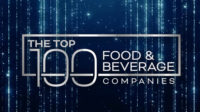Spotlight Feature
2023 Top 100 Food and Beverage Packaging Companies

Nestlé and PepsiCo remained firmly ensconced among the Top 10 food and beverage packaging companies (taking the No. 2 and No. 3 spots, respectively), but both companies were bested by Cargill, which reported record annual revenue of $165 billion for fiscal year 2022 – a 23% jump from the prior year.
Cargill’s annual revenue for fiscal year 2023 (ended May 31, 2023) went on to climb another 7% to $177 billion.
It should be kept in mind that Cargill is a global agricultural commodities trader. Russia’s invasion of major corn and wheat exporter Ukraine in February 2022 has driven up demand for crops that companies like Cargill ship around the world.
Privately-held Cargill ended public reporting of most of its quarterly and annual financial data in 2020 but reports its full-year sales in an annual report.
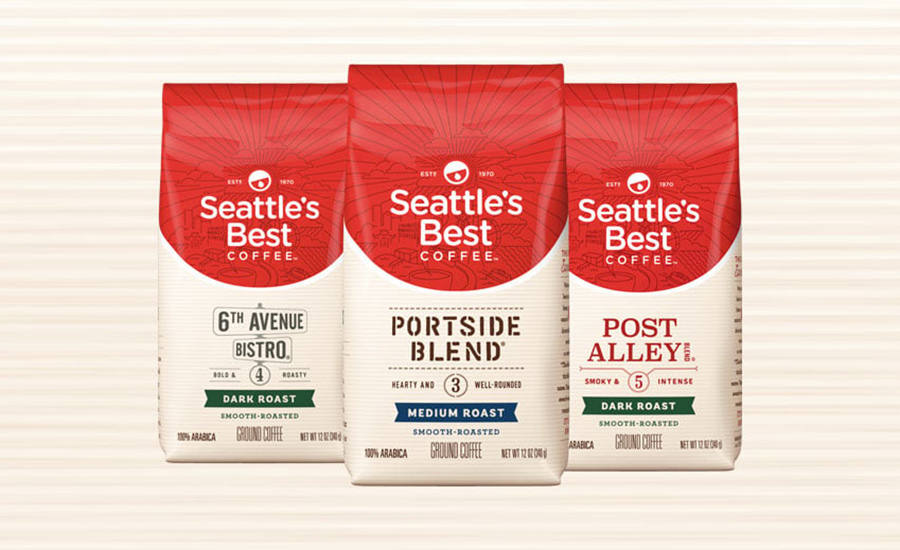
Image Courtesy of Seattle’s Best Coffee
Highlights of the Year
- In April 2023, Nestlé and private equity firm PAI Partners announced an agreement to set up a joint venture for Nestlé’s frozen pizza business in Europe, creating a dedicated player in a competitive and dynamic category.
- In October 2022, Nestlé announced plans to acquire the Seattle’s Best Coffee brand from Starbucks. Seattle’s Best Coffee’s line of whole bean, roast and ground packaged coffee, and K-Cup pods are available in a variety of roasts and flavor profiles across both foodservice and grocery channels.
- A newcomer to the Top 10 is LVMH Möet Hennessy Louis Vuitton, the world’s leading luxury goods group, which recorded 2022 revenue of 79.2 billion euros (approximately US$84.54 billion), up 23% from the prior year. The company said good growth in Champagne and Cognac contributed to the strong 2022 results.
- As was the case last year, Brazil’s JBS SA once again made the Top 10, dropping from the No. 3 spot to the No. 5 spot despite recording a 12% uptick in annual revenue to US$72.60 billion. One recent focus of the company has been to provide more plant-based food options for “flexitarians” – people looking to include new protein sources in their diet.
- Unilever plc jumped to the No. 6 spot after coming in at No. 18 last year. The company noted that dressings had a strong year in 2022 with broad-based, double-digit price growth and a modest volume decline, supported by continued high growth of Hellmann’s, particularly in the United States.
- Mars remained in the Top 10 – but barely – dropping from the No. 6 spot to the No. 10 spot despite a slight uptick in annual revenue. Mars announced in December the signing of an agreement to acquire Trü Frü, a high-growth, better-for-you, whole-fruit snacking brand. Trü Frü’s snacks – made from real fruit and immersed in premium chocolate – are available in both frozen and shelf-stable format across the United States.
- France’s Danone dropped from the No. 11 spot to the No. 16 spot despite annual revenue essentially holding steady at $29.14 billion. Danone noted that, for Q4 2022, North American sales were up by 9.7% year on year, “led in particular by International Delight in Coffee Creations, Activia and Oikos in Yogurt and Silk in Plant-based.” In Waters, evian posted double-digit growth.
- Coca-Cola dropped out of the Top 10 to the No. 11 spot despite recording an 11% increase in annual revenue to $43.0 billion. Unit case volume of sparkling soft drinks was even for Q4 2022 and grew 4% for the year, benefiting from strong performance in Latin America and Asia Pacific and unfavorably impacted by the suspension of business in Russia. Similarly, unit case volume of trademark Coca-Cola was even for Q4 2022 and grew 4% for the year.
- Kellogg, U.S., essentially stood its ground, dropping just one spot to the No. 34 position and reporting an 8% increase in annual revenue to $15.32 billion. For full-year 2022, Kellogg North America’s reported net sales increased by 10% thanks to such factors as sustained momentum in snacks and recovering cereal sales.
- Hershey Co. moved up three spots to No. 51, with annual revenue increasing by 16% to $10.42 billion. The company in March 2023 announced the release of dairy-free alternatives for two of its most iconic brands with Reese’s plant-based peanut butter cups going on sale that same month – making it the first vegan chocolates sold nationally – followed by Hershey’s plant-based extra creamy with almonds and sea salt, in April.
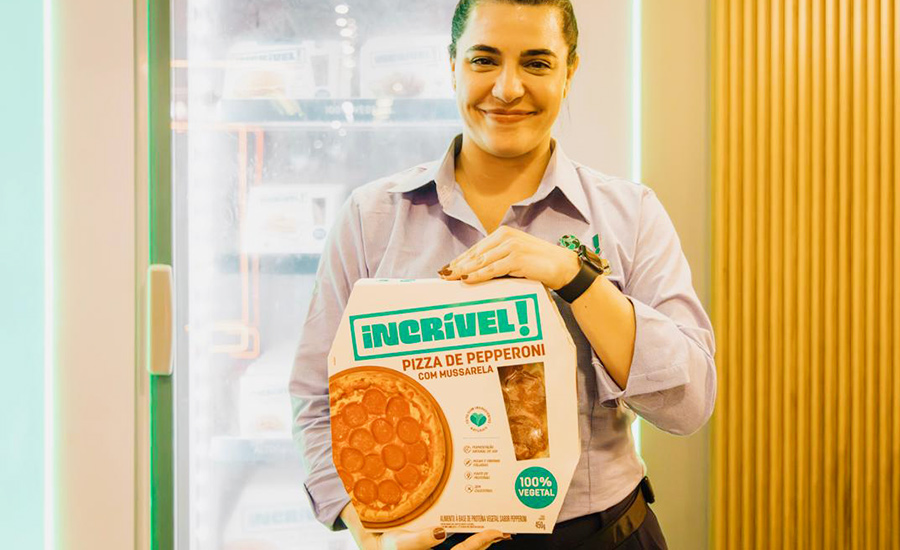
Image Courtesy of JBS SA
Sustainability Still Important for Consumers
Sustainability considerations continue to influence the majority of the world’s grocery shoppers when buying packaged foods.
This was evident in good natured’s recently released “Ready-to-Eat Report” regarding consumer demand for ready-to-eat meals, meal kits, takeout food and meal delivery. Among consumers surveyed, 77% of respondents say that eco-friendly food packaging is important to them and that they usually look at a product’s packaging when shopping.
It’s also worth noting that FMI-The Food Industry Association and North American Meat Institute’s 2023 “Power of Meat” study found that 52% of meat eaters surveyed weigh environmental factors such as sustainability and recycling when making food and meat product choices at the grocery store.
Also, according to Mintel (Global Packaging Trends 2022), 36% of U.S. consumers have selected a product because it had more environmentally responsible packaging than a competitor.
It would be impossible to include in this article all of the initiatives that food and beverage packaging companies have launched to make their products and packaging more eco-friendly, but here are some examples.
PepsiCo
In December, PepsiCo announced a global packaging goal intended to double the percentage of all beverage servings it sells delivered through reusable models from 10 to 20 percent by 2030. This ambition is part of PepsiCo Positive (pep+), the company's strategic, end-to-end business transformation that puts sustainability and people at the center of how the company will create growth and value.
Offering its iconic beverages in reusable packaging and on innovative platforms that eliminate the need for single-use virgin plastic is not new to PepsiCo. It has been an important element of the company’s Sustainable Packaging Vision since 2018, when PepsiCo invested over $3.2B to acquire SodaStream, the world's leading reuse platform, and expressed its commitment to a circular economy for plastics by joining the New Plastics Economy Global Commitment.
“Reuse is also a critical lever to meet PepsiCo's goals to reduce virgin plastic per serving by 50% by 2030 and to become Net Zero by 2040, and progress toward these goals will also be driven – in partnership with our bottlers – by increasing recycled content in our packaging,” the company says.
Furthermore, PepsiCo announced in August that it will eliminate plastic rings on beverage multipacks across the United States and Canada by introducing recyclable paper-based designs.
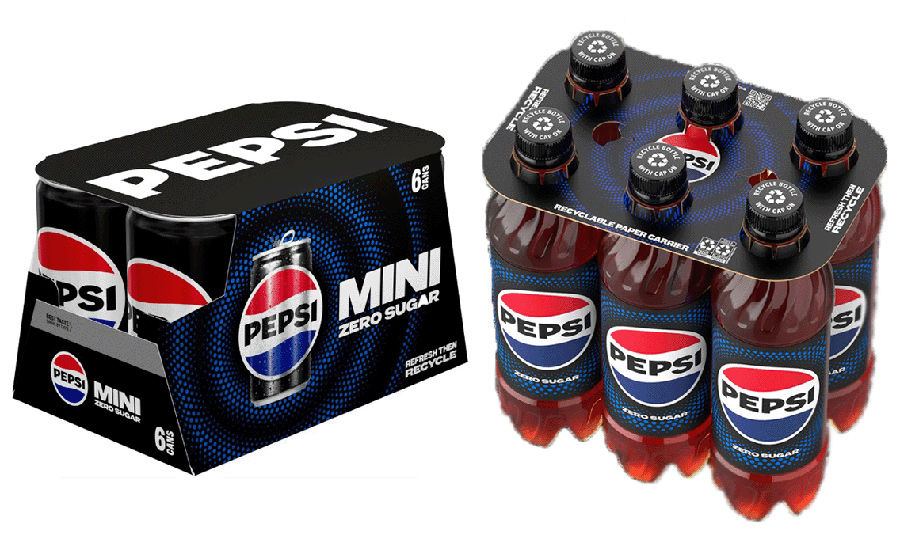
Image Courtesy of Pepsico
Mars Incorporated
Packaging Strategies reported in October on Mars announcing a packaging change for KIND bars.
Mars, Incorporated reported reaching a key milestone in its commitment to a circular economy where packaging material never becomes waste. The new KIND snack bar packaging incorporates recycled content made from advanced recycling, meaning it contains less virgin plastic compared to previous products.
The new material has been completely redesigned for maximum circularity and is produced through the recycling of used mixed plastic that would otherwise be destined for incineration or landfill. This means that the new packaging is eligible for drop-off recycling in the UK, and curbside recycling in Ireland.
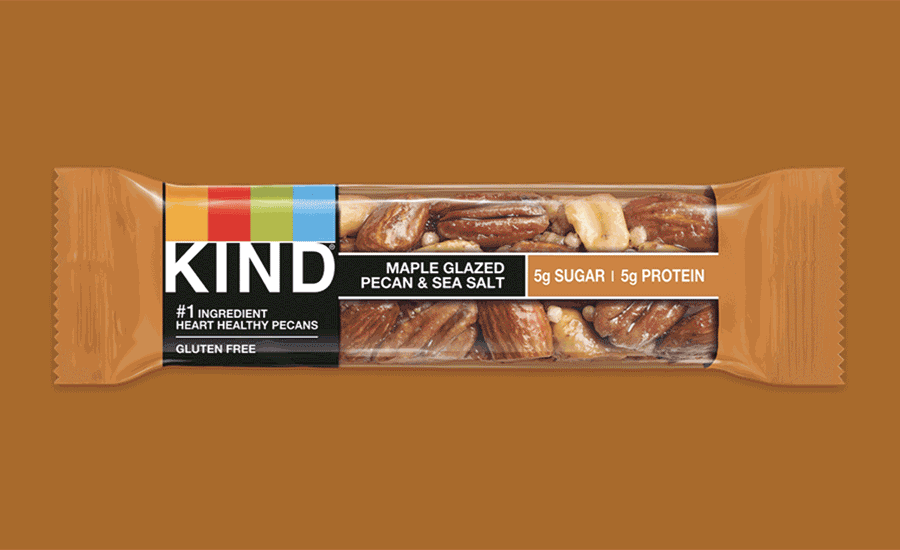
Image Courtesy of KIND
Coca-Cola
Coca-Cola reported progressing on ambitious packaging goals, noting that it continues to collaborate with partners to address challenges and create a circular economy for packaging.
In India, the company partnered with the grocery delivery service Zepto for a “return and recycle” initiative for PET bottles. Consumers can access the “Return PET Bottles” feature on the Zepto app, where they can opt to return four empty PET bottles, to be collected by Zepto riders.
In Latin America, the company partnered with food aggregator Rappi to collect empty PET bottles. In the Philippines, the company is transitioning the existing PET packaging of some of its brands to 100% recycled PET, excluding caps and labels, utilizing new sources of recycled PET from the joint venture investment PETValue, the first bottle-to-bottle recycling facility in the country.
| COMPANY/HQ | LOCATION | KEY BRANDS | 2021 SALES (IN U.S. $ BILLIONS) | |
| 1 | Cargill | Minneapolis, MN | Sterling Silver, Rumba, Diamond Crystal, Truvia, Angus Pride | $165.00p |
| 2 | NESTLÉ SA | Vevey, Switzerland | Hot Pockets, Purina, Dreyer’s, Stouffer’s, Nestlé, Lean Cuisine, Perrier, Nesquik, Nescafé, Starbuck RTD in Latin | $101.03 |
| 3 | PEPSICO | Purchase, NY | Lay's, Quaker, Doritos, Ruffles, Tostitos, Fritos, Pepsi, Gatorade, Tropicana, Aquafina, Mountain Dew, Lipton, Naked, Starbucks RTD in U.S. | $86.39 |
| 4 | LVMH Moet Hennessy Louis Vuitton | Paris France | Moet & Chandon, Belvedere, Hennessy, Dom Perignon, Veuve Clicquot, Krug | $84.54 |
| 5 | JBS SA | São Paulo, Brazil | Swift, Cedar River Farms, Pilgrim's, Moy Park, Plumrose | $72.60 |
Register for free to view the complete Rankings and get unlimited access to packagingstrategies.com. Already a Registered User? Sign in now

Top Food and Beverage Packaging Companies in the News
More on top food packaging companies | More on top beverage packaging companies
Methodology:
Our Top 100 Food & Beverage Packaging Companies list uses sources that include annual company reports, news reports, company websites and direct company contacts. Sales are based on calendar year 2022 or the most recent fiscal year that conforms to that timeframe. We used XE, the online currency counter (xe.com), where necessary. We have also used resources to separate food and beverage revenue from other segment revenue. Some companies are are marked with an “e” to indicate an estimate when one of the following occurred: a breakdown of food versus other segments was not possible; it’s a private company and news sources reported the data, not the company directly; or no new information could be found, resulting in reporting 2021 revenue.
Looking for a reprint of this article?
From high-res PDFs to custom plaques, order your copy today!







